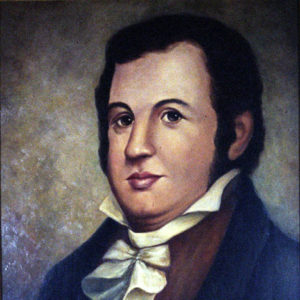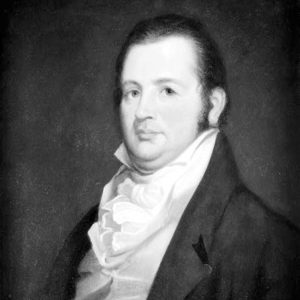calsfoundation@cals.org
John Pope (1770–1845)
John Pope served variously from 1798 to 1842 as a U.S. senator and congressional representative from Kentucky, secretary of state for Kentucky, and the third territorial governor of Arkansas. Initially affiliated with the Democratic-Republican Party, he joined the Whig Party in the 1830s. During his tenure as territorial governor, he worked to establish a legislative program to promote migration and economic development and to rid the region of its reputation as a violent and politically unstable frontier.
John Pope was born in February 1770 (exact date not known) in Prince William County, Virginia, the eldest son of Colonel William and Penelope Edwards Pope. The Pope family moved near Louisville, Kentucky, in 1779 at the height of the American Revolution. After an accident on his family’s farm necessitated the amputation of Pope’s arm, his father sent him to a private school in Bardstown, Kentucky, where he received a classical education. After graduating from William and Mary College, Pope studied law in Lexington and established a practice in Shelbyville, Kentucky.
In 1798, Pope began a nearly fifty-year political career with his election as a representative for Shelby County in the Kentucky General Assembly. He quickly established himself as a significant figure in Kentucky politics and proved a worthy rival of Henry Clay, the leading political figure in Kentucky and a rising star on the national political stage. Throughout his career, Pope earned a reputation for a careful study of issues and for holding steadfast to his stated positions regardless of potential political fallout. For example, his opposition to the United States’ entry into the War of 1812 (a conflict advocated by Henry Clay, a leading congressional “War Hawk”) factored into his unsuccessful reelection bid after serving a single term in the U.S. Senate from 1807 to 1813, during which time he also held the office of president pro tempore.
Despite his sometimes controversial beliefs and uncompromising sense of ethics, Pope also knew how to gain important political contacts. He became a political ally of Andrew Jackson in 1819 and enthusiastically supported the frontier hero’s presidential candidacy in 1828. After Jackson’s election as president of the United States, he appointed Pope as the territorial governor of Arkansas in the spring of 1829.
Early in his first term, he expressed his vision for Arkansas: that it might become “by a wise and just course of policy, the enterprise, public spirit, intelligence, and elevated character of the people, a bright star in the political constellation.” Almost immediately, Pope introduced policies designed to turn this vision into a reality.
Pope used census figures to determine that the number of representatives in the legislature should be increased and distributed in a more equitable fashion; accordingly, he raised the number of representatives from nine to twenty-three and devised a plan for their distribution. To improve the efficiency of the territorial mail service, Pope recommended a weekly steamboat river route between the cities of Little Rock (Pulaski County); Memphis, Tennessee; and New Orleans, Louisiana. The legislature chose a slightly altered plan, using the newly constructed Military Road as a weekly overland route between Little Rock and Memphis. Influenced by his adherence to the Jacksonian principle of expansive democracy, Pope made many of the territory’s offices elected rather than appointed. These policies formed the framework of Pope’s desire to increase migration to the territory and diminish its reputation as a place of violence and corruption that was unsuitable for settlement by virtuous families. Pope demonstrated his commitment to this ideal by becoming the first territorial governor of Arkansas to move his family to the raucous territory when he arrived on May 31, 1829.
Pope married three times. His first wife, Ann Henry died on March 1, 1806; this marriage produced no children. Eliza Pope, whom he married in Lexington on February 11, 1810, was the sister-in-law of future President John Quincy Adams. This marriage produced two daughters, Elizabeth and Florida; Florida Pope died young. Following the death of Eliza on April 24, 1818, he married widow Frances Walton Pope on May 1, 1820 in Washington County, Kentucky.
Pope’s most persistent and belligerent opponent during his tenure in Arkansas was Robert Crittenden, another former Kentuckian who led the territory for more than a year due to the delayed arrival of Governor James Miller. Fortunately for Pope, he gained the powerful allegiance of Colonel Ambrose Sevier and the Arkansas Gazette; both shared his vision of Arkansas as a land ripe for positive improvements. These allies proved valuable during the peak of Crittenden’s opposition, as the encounters with the Crittenden faction were at the center of most of Pope’s difficulties in office. Pope’s earlier rivalry with Henry Clay had been one of honest ideological difference expressed with anger and passion, but also respect, by men of intelligence and eloquence who happened to differ on policy issues. The rivalry with Crittenden, by contrast, was founded on spite and jealousy and fought by way of bitterly partisan journalism rather than open and direct debate. The Crittenden faction’s purpose was to discredit and embarrass Pope in the eyes of his supporters; however, it had little, if any, effect on Pope’s popular reputation.
The Pope-Crittenden rivalry became particularly heated during the creation of the territory’s capitol building. In 1831, Crittenden and his followers in the legislature proposed an exchange of his home for the lands being sold to finance the capital’s construction. Pope vetoed the bill in question, recognizing the measure as a profiteering manipulation. Pope continued the program of land sales and selected the site for construction of a magnificent Greek Revival structure. Completed in 1842, the Old State House (as the structure is now known) still stands and is the oldest surviving state capitol building west of the Mississippi River.
Pope’s tenure in Arkansas ended sooner than he would have liked. By 1834, his political convictions were increasingly at odds with the anti-bank, anti-tariff policies of the Jackson administration. After he made these differences known to Jackson in a private letter, Jackson did not appoint Pope to a third term as territorial governor in 1835 but instead replaced him with William S. Fulton. Although Pope was not governor when Arkansas entered the Union as the twenty-fifth state in 1836, his vision of organization and reform, and the policies that gave shape to that vision, clearly set the stage for statehood. Pope County was named in his honor to recognize his role in the state’s development.
At the end of his tenure in Arkansas, Pope returned to Kentucky and won election to the U.S. House of Representatives. He served in that capacity from 1837 to 1843 and died on July 12, 1845, at the age of seventy-five. He is buried on Cemetery Hill in Springfield, Kentucky.
For additional information:
Baylor, Orval. John Pope, Kentuckian: His Life and Times, 1770–1845. Cynthiana, KY: The Hobson Press, 1943.
Blakey, George T. “Rendezvous with Republicanism: John T. Pope vs. Henry Clay in 1816.” Indiana Magazine of History 62 (September 1966): 233–50.
John Pope Papers. Filson Club Historical Society, Louisville, Kentucky.
Pope County Historical Association. History of Pope County, Arkansas. Winston-Salem, NC: Hunter Publishing Company, 1979.
White, Lonnie J. “The Fall of Governor John Pope.” Arkansas Historical Quarterly 23 (Spring 1964): 74–84.
Robert Patrick Bender
Eastern New Mexico University–Roswell
This entry, originally published in Arkansas Biography: A Collection of Notable Lives, appears in the CALS Encyclopedia of Arkansas in an altered form. Arkansas Biography is available from the University of Arkansas Press.
 Louisiana Purchase through Early Statehood, 1803 through 1860
Louisiana Purchase through Early Statehood, 1803 through 1860 Politics and Government
Politics and Government John Pope
John Pope  John Pope
John Pope 




Comments
No comments on this entry yet.